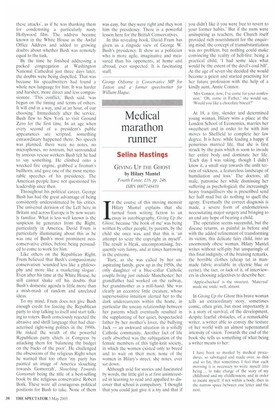Medical marathon runner
Selina Hastings
GIVING UP THE GHOST by Hilary Mantel Fourth Estate, £16, pp. 246, ISBN 0007148410 1 n the course of this moving memoir Hilary Mantel explains that she turned from writing fiction to an essay in autobiography, Giving Up the Ghost, because 'the book of me' was being written by other people, by parents, by the child she once was, and that this is 'an attempt to seize the copyright in myself. The result is bleak, uncompromising, frequently very funny, and at times harrowing in the extreme.
'Ilary, as she was called by her unaspirating family, grew up in the 1950s, the only daughter of a blue-collar Catholic couple living just outside Manchester; her grandfather had worked on the railway, her grandmother as a mill-hand. She was clearly an eccentric little creature, whose supersensitive intuition alerted her to the dark undercurrents within the home, in particular the uneasy relationship between her parents which eventually resulted in the supplanting of her quiet, bespectacled father by her mother's lover, the bullying Jack — an awkward situation in a solidly Catholic community. Another fact of life early absorbed was the subjugation of the female members of this tight-knit society, in which the women existed only to breed and to wait on their men; none of the women in Hilary's street, she notes, ever sat down.
Although avid for stories and fascinated by words, the little girl is at first uninterested in learning to read and appalled to discover that school is compulsory. 'I thought that you could just give it a try and that if you didn't like it you were free to revert to your former habits.' But if the nuns were uninspiring as teachers, the Church itself provided rich nourishment for the enquiring mind: the concept of transubstantiation was no problem, but nothing could make convincing the reality of hell-fire: being a practical child, 'I had some idea what would be the extent of the devil's coal bill'. At the age of seven she decided she would become a priest and started practising for her future profession with the help of a kindly aunt, Annie Connor.
'Mrs Connor, now, Eve come for your confession."Oh, come in Father,' she would say. 'Would you like a chocolate biscuit?'
At 18, a tiny, slender and determined young woman, Hilary wins a place at the London School of Economics, marries her sweetheart and in order to be with him moves to Sheffield to complete her law degree. It is here, while leading a happy if penurious married life, that she is first struck by the pain which is soon to invade her entire body and dominate her life, 'Each day I was taking, though I didn't know it, a small step towards the unlit terrain of sickness, a featureless landscape of humiliation and loss.' The doctors, all male. patronise her while dismissing her suffering as psychological; the increasingly heavy tranquillisers she is prescribed send her half mad but do nothing to quell the agony. Eventually the correct diagnosis is made, a severe form of endometriosis necessitating major surgery and bringing to an end any hope of bearing a child.
The operation seems successful, but the disease returns, as painful as before and with the added refinement of transforming its victim, this delicate fairy child, into an enormously obese woman. Hilary Mantel writes without self-pity but unsparingly of this final indignity, of the bruising remarks, the horrible clothes (cheap tat in manmade fabric available in electric blue or cerise), the tact, or lack of it, of interviewers in choosing adjectives to describe her:
'Apple-checked is the sweetest. 'Maternal' made me smile: well, almost.
In Giving Up the Ghost this brave woman tells an extraordinary story, sometimes comic, often grim, but most importantly it is a story of survival, of the development, despite fearful obstacles, of a remarkable writer, a writer able to convey the texture of her world with an almost supernatural intensity of vision. Towards the end of the book she tells us something of what being a writer means to her:
I have been so mauled by medical procedures, so sabotaged and made over, so thin and so fat, that sometimes I feel that each morning it is necessary to write myself into being ... to take charge of the story of my childhood and my childlessness: and in order to locate myself, if not within a body, then in the narrow space between one Letter and the next.










































































 Previous page
Previous page